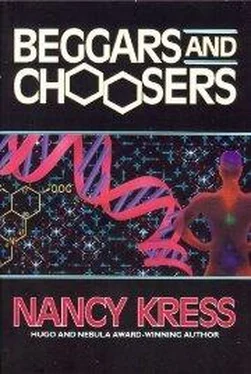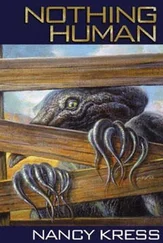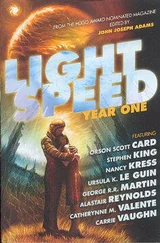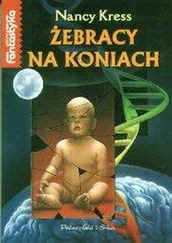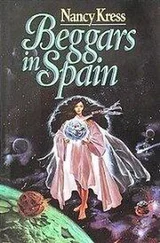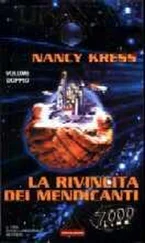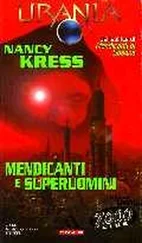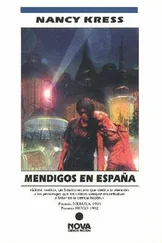And Jack Sawicki looked down at the ground, him, like he was ashamed. We all were, us. I don’t know of what. We were Liver citizens, after all.
The mayor and two men helped, them, to load the two travoises with everything we could from the food line. Jeanette Harloff wanted us to stay the night in the hotel, but we all said no, us. The same thing was in all our minds. Folks were sitting home hungry, them, in East Oleanta: kids and wives and mothers and brothers and friends, with their bellies rumbling and hurting and that pinched look around their eyes. We’d rather walk back now, us, even after it got dark, than hear those bellies and look at them faces in our minds. We stuffed food off the belt into our mouths while we loaded the travoises, stuffed it into our jackets and hats and gloves. We bulged like pregnant women, us. The Coganville people watched in silence. A few left the cafe, them, their eyes on the floor.
I wanted to say: We trusted our congresswoman, too, us. Once.
There was only so much food prepared for the line. The travoises would hold more. When it ran out, we had to stop, us, and wait for the kitchen ’bots to make more. And all that whole time nobody except Jeanette Harloff spoke to us. Nobody.
When we left, us, we carried huge amounts of food. Looking at it, I knew it wouldn’t be huge when there was all the hungry people of East Oleanta to feed. We’d be back tomorrow, or somebody else would. Nobody said that to Jeanette Harloff. I couldn’t tell, me, if she knew.
The sky had that feel that says the most part of the day is over. Stan Mendoza and Scotty Flye, the youngest and strongest, dragged the travoises first, them. The runners were curved plasti-foam, smoother than any wood could be. They slid easily over the snow. This time, at least, we had the wind at our backs.
After half an hour Judy Farrell said, “We can’t even talk, us, to the next town, with the terminal. We can talk to Albany, us, or to any donkey politician, and we can get information easy, but we can’t talk to the next town to tell them we’re out of food.”
Jim Swikehardt said, “We never asked to, us. More fun to just hop the gravrail. Gives you something to do.”
“And keeps people separate, us,” Ben Radisson said, but not angry, just like he never thought of it before. “We should have asked, us.” After that, nobody said nothing.
After dark, the cold got sharp as pain. I could feel, me, the hollow place in my chest where the wind whistled through. It made a noise inside me that I could hear in my ears. The Y-lights made the tracks bright as day, but the cold was a dark thing, it, circling us like something rabid. My bones felt, them, like icicles, and just as like to snap.
But we were almost there. No more than a mile left to go. And then there was the crack of a rifle, and young Scotty Flye fell over dead.
In another minute they were on us, them. I recognized most of them, me, although I only had names to go with two of them: Clete Andrews and Ned Zalewski. Stomps. Ten or twelve of them, from East Oleanta and Pilotburg and Carter’s Falls, come in before the gravrail busted, and then stuck here. They whooped and hollered, them, like this was a game. They jumped Jack and Stan and Bob and I saw all three go down, even though Stan was a big man and Bob was a fighter, him. The stomps didn’t waste no more bullets, them. They had knives.
I pushed the little black box on my belt.
The tingle was there, it, and the shimmer. A stomp jumped me and I heard him hit solid metal. That’s what it sounded like. I could hear everything, me. Judy Farrell screamed and Jack Sawicki moaned. The stomp’s eyes under his ski mask got wide.
“Shit! The old fart’s got a shield, him!”
Three of them pounded on me. Only it wasn’t me, it was a thin hard layer an inch from me, like I was a turtle in an uncrackable shell. They couldn’t touch me, them, only push and pull the shell. Finally the first stomp yelled something with no words, him, and shoved the shell so hard I went over the edge of the track and down a little embankment, picking up snow like the snowmen Lizzie used to roll, her. Something in one knee cracked.
By the time I staggered, me, back up to the gravrail track, the stomps were disappearing into the woods, dragging the travoises.
Only Scotty was dead. The others were in bad shape, them, especially Stan and Jack. Stab wounds and broken heads and I couldn’t tell, me, what else. Nobody could walk. I staggered the last mile through the snow, me, afraid to carry one of the lights, feeling for the track every time I fell down. Some men from East Oleanta met me part way, them, just when I didn’t think I could go no further. They’d heard the rifle shot.
They went out to get the others. Somebody, I don’t know who, carried me to Annie’s. He didn’t say nothing about me wearing a donkey personal shield. Or maybe it was turned off by then. I can’t remember, me. All I remember is me saying over and over again, “Don’t crush them, you! Don’t crush them, you!” There were six sandwiches in my jacket pocket. For Lizzie and Annie and Dr. Turner.
Everything didn’t all go black, the way Annie said later. It went red, it, with flashes of light in my knee, so bright I thought they would kill me.
But of course they didn’t. When the red went away it was the next day, and I laid, me, on Annie’s bed, with her asleep next to me. Lizzie was there, too, on the other side of Annie. Dr. Turner bent over me, doing something to my knee.
I croaked, “Did they eat?”
“For now,” Dr. Turner said. Her voice was grim. What she said next didn’t make no sense to me. “So much for community solidarity in the face of adversity.”
I said, “I brought Annie and Lizzie food, me.” It seemed a miracle. Annie and Lizzie had something to eat. I did it, me. I didn’t even think, then, that two sandwiches wouldn’t keep them long. It didn’t even occur to me. I must of been on some of them painkillers, me, that cloud your mind.
Dr. Turner’s face changed. She looked startled, her, like what I said was some kind of good answer to what she said, although it wasn’t, because I didn’t even understand her big words. But I didn’t care, me. Annie and Lizzie had something to eat. I did it, me.
“Ah, Billy,” Dr. Turner said, her voice was low and sad, mournful, like somebody died. Or something. What?
But that wasn’t my problem. I slept, me, and in all my dreams Lizzie and Annie smiled at me in a sunshine green and gold as summer on the mountain, where it turned out, I learned later, that Stan and Scotty and Jack and Dr. Turner’s something had all really died after all.
DIANA COVINGTON: EAST OLEANTA
After they brought Billy back to Annie Francy’s, his poor heart laboring like an antique factory and his hands shaking so much he couldn’t even turn off the personal shield, I realized what an ass I’d been not to call the GSEA earlier.
But it wasn’t Billy who made me realize this. It was — again, always — Lizzie .
I knew that Billy wasn’t badly hurt, and I suppose I should have been more concerned about the other Livers, especially the three dead. But the fact was, I wasn’t. I had changed my mind about Livers since I came to East Oleanta, and Jack Sawicki in particular seemed a good man, but there it was. I just didn’t really care that Liver stomps had turned on other Liver non-stomps and destroyed them. We donkeys had never expected anything else. The Livers were always a potentially dangerous force, kept at bay only by sufficient bread and circuses, and now the bread was running short and the big tops folded. Bastille time.
But I cared — against all odds — about Lizzie. Who was going hungry. If I called the GSEA, they would come storming in and East Oleanta would no longer be the Forgotten Country. With them would come food, medicine, transport, all the things Livers had come to expect from the labor of others. Which meant Lizzie and Annie would get fed.
Читать дальше
